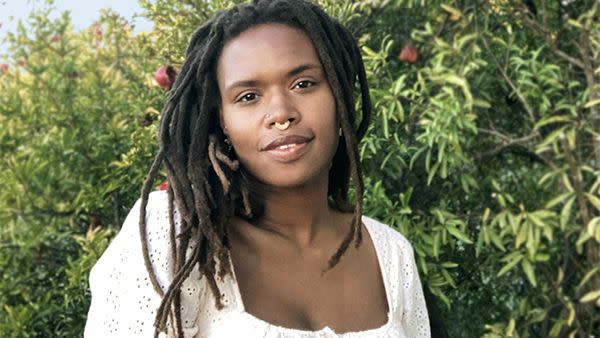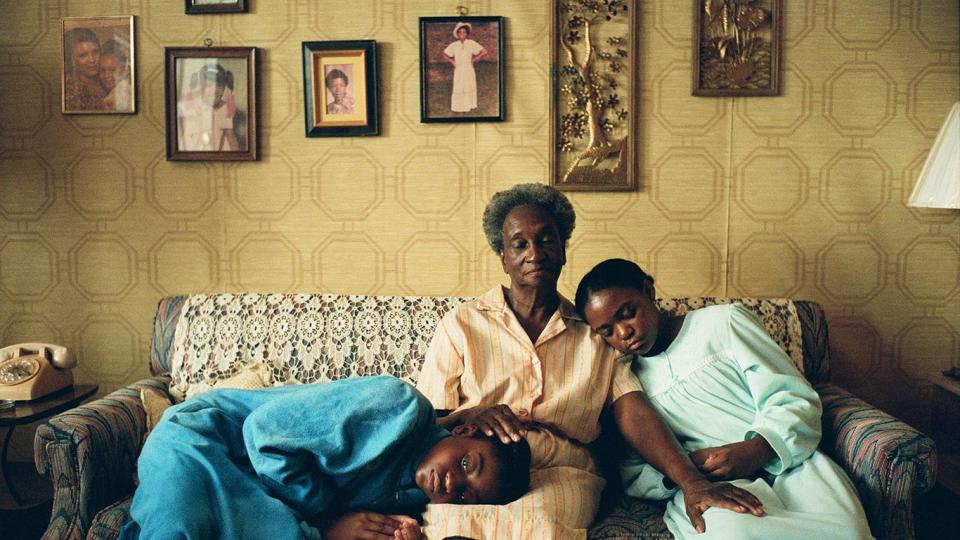Raven Jackson's New Film is Poetry

All Dirt Roads Taste of Salt, director Raven Jackson’s feature-length debut, is as poetic as its title. A mosaic of memories of Black Southern girlhood, the film is like a photo album in your grandma’s house. It moves with the fluidity of water and the vibrancy of a cacophony of crickets chirping on a hot Mississippi night. The Barry Jenkins–produced picture showcases another artistic dimension for Jackson who first found her creative voice as a poet.
The film has already been met with critical acclaim, with Rotten Tomatoes calling it a “beautifully elegant exploration of grief and longing.” Over Zoom, Jackson spoke to Harper’s Bazaar about the film, its experimental nature, eating dirt, and more.

What does the title of the film mean, and how did you come up with the story?
The title of the film comes from a poem I wrote—that has nothing to do with the film—but I wrote the title after a conversation with my grandma around the practice of eating clay dirt. And when I added that element into the film, it just, for me, really made the title sing even more.
I came to the film—it wasn't just one moment. It was like many seeds. I knew I was interested in exploring the life of a woman in the South and doing so in a nontraditional way. But to come to the story, I needed to be on the soil of the film. I had to take photographs of family members, of landscapes in the South. I'm from the South, my people are from the South, and taking those photographs really helped me to land myself in the story, or in the world that would eventually become the story. And then it was just a matter of writing things until eventually landing on the script.
Can you tell me a bit more about the practice of eating clay dirt?
It comes from many cultures, across centuries, [who] have passed through a phase of eating clay, but it came to the South of the United States through slavery from West Africa. And a lot of Black women in the South grew up eating it. In one of the scenes, when you see Sheila's character and Young Mack digging for dirt—that was actually a place known to Black women in the area, [who] would dig for clay dirt in that place. It was a nice discovery when I was location scouting that really led me to want to shoot there. But it's like a snack. I tried it in the research of the film, and I mean, it tastes good to me. It's not just any dirt—it's very specific dirt. I would say it's less prevalent today because the dirt isn't clean like it was then.
Water appears throughout your work as a symbol, including in your short film A Guide to Breathing Underwater. A lot of Black female artists—like Kelela, Victoria Monét, Tems—this year in particular have gravitated toward water imagery. Can you tell me about your own relationship to water?
I have a deep reverence for water. I grew up fishing. I am very intrigued by the water cycle, which the film of course speaks to. I see water as a portal in a lot of ways. I think it holds a lot.
Writers are like that in a way, and flooding was something that came a lot to me when thinking about this film. For me, the question is: If our lives were to flood, what are those moments that would rise to the surface, and how would they spill in between each other? The fluid quality of water itself really resonates with me and speaks to me—how it changes form, how we change form, the season of our lives. Just that fluid quality really, resonates with me.
All Dirt Roads is a very experimental film. How did you composite all of those scenes together?
I knew in the writing of it that it's a very modular film, and that how it lives on the page isn't exactly how it's going to want to live when it's in the edit. I worked with Lee Chatametikool in the editing room, who has experience with working with more fluid films or films that play with structure, and so it was similar to how the writing process was. … it would just be seeing what emotionally hit, you know what I mean? Having index cards, seeing what could live side by side. Because of course, you have the script, but it's like, once you have actually shot it and something's hitting different emotionally—it took its time in a way you didn't necessarily expect, or maybe it's even quicker. It was just seeing what we have, and then taking the time to see what [scenes] wanted to live by each other.

How did Barry Jenkins get involved with the film?
He selected the project. I didn't have a complete draft yet, but I submitted it to the Indie Memphis Black Filmmaker Residency [for Screenwriting], and he was the judge, and he selected a winner. And then a few months later, he officially came on board, once we were ready to start sending out the script to producers, production companies. Me and Maria Altamirano, who is my day one producer, we talked to him and his team at Pastel, which he runs with Adele Romanski and Mark Ceryak. And once we met with them, we just knew it was them. They understood the project, weren't afraid of the risk … it was just exciting to meet people who were excited to meet with us, because the film is asking collaborators to meet.
Was he hands-on as a producer?
Yes, I would say so. He's available, and he really offers his thoughts and wants to be supportive in whatever way the filmmaker needs, in my experience.
What films or art pieces would you say informed this film?
There's a poet, Lucille Clifton, who really speaks to the film to me—and actually, a line of her poetry opened the script. I would say my grandma's photo albums informed the visuals of the film, the production design, and the costume design.
And Deana Lawson's work—I love her work and the textures of her photographs. The sound design of Carlos Reygadas’s Silent Light was a reference, as far as like the experiential nature and the viscerality of his sound design. Those are a few references that come to mind.
Do you feel like your work as a poet feeds a different aspect of your artistic being, or is the relationship between poetry and filmmaking more symbiotic than different?
I think it's different in some ways, and it works. I find that it's mostly like they're mostly holding hands, rather than like on two separate pages. At least for the creator I am. And I'm grateful I studied poetry first, because I feel it was a gift for me to discover my obsessions on the page first, and explore them visually on the page first, and know what those were, and still, of course, [they were] involved when I started to learn film. But I'm grateful I studied writing first, because that led to script writing. It's easier to see how my poetry exists in screenwriting.
This interview has been condensed and lightly edited for clarity.
You Might Also Like


